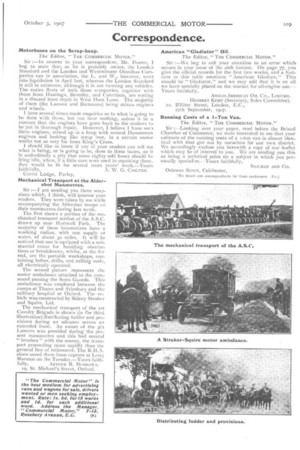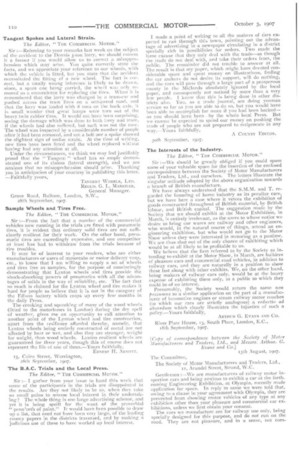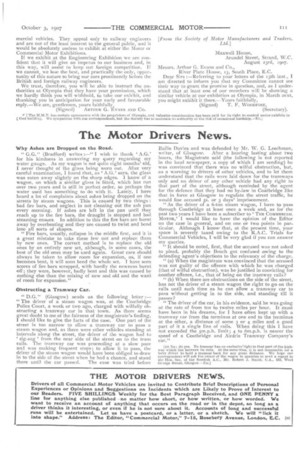Correspondence.
Page 25

Page 26

Page 27

If you've noticed an error in this article please click here to report it so we can fix it.
Motorbuses on the Scrap-heap.
The Editor, " THE COMMERCIAL MOTOR."
Sir :—ln answer to your correspondent, Mr, Pearce, I beg to state that, as he is probably aware, the Londen Standard and the London and Westminster Omnibus Companies ran in association, the L. and W., however, went into liquidation in April last, whereas the London Standard is still in existence, although it is not running any vehicles. The. entire fleets of both these cempanies, together with those from Hastings, Bromley, and Caterham, are rotting in a disused tram depot in West Ham Lane. The majority of them (the Lacoste and Battmans) being minus engines and wheels.
I have several times made enquiries as to what is going to be done with these, but can hear nothing, unless it be a rumour that the engines have gone back to the makers to be put in thorough repair. However, I believe I have seel these engines, mixed up in a heap with several Duoommon engines and looking like scrap iron, in a certain motor works not so very far from King's Cross. I should like to know if any of your readers can tell me what is being, or is going to be, done to these buses, as it is undoubtedly a pity that some eighty odd buses should be lying idle, when, if a little care were used in repairing them, they would be fit for several more years' work.—Yours
faithfully, A. W. G. CHILVER. Corns Lodge, Purley,
Mechanical Transport at the Aldershot Manceuvres.
Sir :—I am sending you three snapshots which, I think, will interest your readers. They were taken by me while accompanying the Aldershot troops on their manoeuvres during last week.
The first shows a portion of the mechanical transport section of the A.S.C. drawn up near Hartwell Park. The majority of these locomotives have a working radius, with one supply ot water, of about 30 miles. It will be noticed that one is equipped with a substantial crane for handling obstructions or breakdowns, whilst, at the for end, are the portable workshops, containing lathes, drills, and milling tools, all electrically operated.
The second picture represents the motor ambulance attached to the command passing the Scots Guards. This ambulance was employed between the camps at Thame and Aylesbury and the military hospital at Oxford. The vehicle was constructed by Sidney Straker and Squire, Ltd.
The mechanical transport of the est Cavalry Brigade is shown (in [he third illustration) distributing fodder and provisions during an advance across an extended front. An escort of the 5th Lancers was provided during the present manoeuvres and this had several " brushes " with the enemy, the transport proceeding more rapidly than the general line of retirement. The R.H.A. alone saved them from capture at Lem; Marston on the Tuesday.—Yours faith fully, ARTHUR R. BURROWS. 19, St. Michael's Street, Oxford,
American "Gladiator" Oil.
The Editor, "TILE COMMERCIAL MOTOR."
Sir :—We beg to call your attention to an error which occurs in your issue of the 26th instant. On page 77, you give the official records for the first two weeks, and a footnote to this table mentions " American Gladiate." This should be " Gladiator," and we may add that it is an oil we have specially placed on the market for oil-engine use.— Yours faithfully, ANGLO-AMERICAN OIL Co., LIMITED. HERBERT KEivir (Secretary, Sales Committee). 22, Billiter Street, London, E.C.,
27th September, 1907.
Running Costs of a 1-,Ton Van.
The Editor, "THE COMMERCIAL MOTOR."
Sir :—Looking over your paper, read before the Bristol Chamber of Commerce, we were interested to see that your estimate of the running costs of a r-ton van is almost identical with that got out by ourselves for our own district. We accordingly enclose you herewith a copy of our leaflet which may be of interest to you. We are sending you this as being a technical point on a subject in which you personally specialise.—Yours faithfully, SKILMAN AND CO.
Osborne Street, Colchester,
[We thank our correspondents for their enclosures-End
Tangent Spokes and Lateral Strain.
The Editor, " TILE COMMERCIAL MOTOR."
Sir :—Referring to your remarks last week on the subject of the accident to the Dennis 5-ton lorry, we should esteem it a favour if you would allow us to correct a misapprehension which may arise. You quite correctly state the facts, and we appreciate your reference to our wheels, with which the vehicle is fitted, but you state that the accident necessitated the fitting of a new wheel. The fact is correct, but a totally wrong inference is likely to be drawn, since, a spare one being carried, the witez,1 was only removed as a convenience for replacing the tires. When it is remembered that the Lorry was charged by a tram-car and pushed across the tram lines on a sett-paved road, and that the lorry was loaded with 8 tons on the back axle, it is small wonder that great lumps were torn out of the heavy twin rubber tires. It would not. have been surprising, seeing the damage which was done to both lorry and tram, if the wheels had also suffered, but such was not the case. The wheel was inspected by a considerable number of people after it had been removed, and not a bolt nor a spoke showed the slightest sign of undue strain. At the time of writing,, new tires have been fitted and the wheel replaced without haying had any attention at all.
Under the circumstances, we think we may feel justifiably proud that the " Tangent " wheel has so amply demonstrated one of its claims (lateral strength), and we are anxious that no misapprehension should arise. Thanking you in anticipation of your courtesy.in publishing this letter. —Faithfully yours,
TANGENT WHEELS, LTD. REGLD. G. L. MARKHAM,
General Manager.
Sample Wheels and Tires Free..
The Editor, " THE COMMERCIAL MOTOR."
Sir :—From the fact that a number of the commercial vehicles now running in the trials are fitted with pneumatic tires, it is evident that ordinary solid tires are not sufficiently resilient for their work. On the other hand, pneumatic tires are exceedingly expensive, and one competitor at least has had to withdraw from the trials because of tire troubles.
It may be of interest to your readers, who are either
manufacturers or users of motorcabs or motor delivery vans, etc., to know that I am willing to supply a set of wheels and tires free as samples, for the purpose of convincingly demonstrating that Lynton wheels and tires provide the shock-absorbing powers of pneumatics with all the advantages of solids in the way of reliability, etc. The fact that so much is claimed for the Lynton wheel and tire makes it hard for people to believe that it is not in the category of the Edison battery which crops up every few, months in the daily Press.
The creaking and squeaking of many of the wood wheels (fitted to the motorbuses in London) during the dry spell of weather, gives me an opportunity to call attention to another point of the Lynton wheel and tire construction, apart from the resilience afforded thereby, namely, that Lynton wheels being entirely constructed of metal are not affected by heat or wet, and also they are stronger, weight for weight, than wood wheels. Lynton resilient wheels are guaranteed for three years, though this of course does not represent the life of one of theno—Yours faithfully, ERNEST IL ARNOTT.
15, Cairo Street, Warrington, 281h September, 1907.
The R.A.C. Trials and the Local Press.
The Editor, "THE COMMERCIAL MOTOR."
Sir gather from your issue to hand this week that
some of the participants in the trials are disappointed in the results. Are they not likely to be so, when they take so small pains to arouse local interest in their undertaking? The whole thing is one large advertising scheme, and vet it is being spoilt for the want of the proverbial z` penn'orth of paint." It would have been possible to draw up a list, that need not have been very large, of the leading county papers in the districts traversed, and by making a judicious use of these to have worked up local interest. I made a point of writing to all the makers of cars expected to run through this town, pointing out the advantage of advertising in a newspaper circulating in a district specially rich in possibilities for orders. Two made the lame excuse that they only deal with the trade—as though the trade do not deal with, and take their orders from, the public. The remainder did not trouble to answer at all. The result is that my paper, which might have devoted considerable space and spent money on illustrations, finding the car makers do not desire its support, will do nothing, and the cars will pass through a large part of a prosperous county in the Midlands absolutely ignored by the local paper, and consequently not noticed by more than a very few people. I know that this is being done in other districts also. You, as a trade journal, are doing yeoman service so far as you are able to do so, but you would have been able to accomplish far more if you had been backed— as you should have been—by the whole local Press. But we cannot he expected to spend our money on pushing the trade of people who are not prepared to reciprocate in any way.—Yours faithfully, A COUNTY EDITOR.
e,oth September, 1907.
The Interests of the Industry.
The Editor, "THE COMMERCIAL MOTOR."
Sir :—We should be greatly obliged if you could spare some of your valuable space for the insertion of the enclosed correspondence between the Society of Motor Manufacturers and Traders, Ltd., and ourselves. The letters illustrate the singular attitude adopted by the above organisation towards a branch of British manufacture.
We have always understood that the S.M.M. and T. regarded the fostering of home industry as its peculiar care, but we have here a case where it vetoes the exhibition of goods constructed throughout of British material, by British labour, and British capital. The suggestion made by the Society that we should exhibit at the Motor Exhibition, in March, is entirely irrelevant, as the users to whose notice we desire to bring our wares are railway and other engineers, who would, in the natural course of things, attend an engineering exhibition, but who would not go to the Motor Show unless they were interested in motoring as a pastime. We are thus shut out of the only chance of exhibiting which would be at all likely to be profitable to us. We believe that the firm referred to by the Society as intending to exhibit at the Motor Show, in March, are builders of pleasure cars and commercial road vehicles, in addition to railway cars, and they are-naturally in a position to show these last along with other exhibits. We, on the other hand, being makers of railway cars only, would be at the heavy expense of exhibiting these only, to a public to which they could be of no interest.
Presumably, the Society would return the same non possumus to a similar application on the part of a manufacturer of locomotive engines or steam railway motor coaches (to which our cars are strictly analogous) a reductio ad absurdum which clearly illustrates the injustice of such a policy.—Yours faithfully,
ARTHUR G. EVANS AND CO.
River Plate House, 13, South Place, London, E.C., 18th September, 1907.
[Copy of correspondence between the Society of Motor Manufacturers and Traders, Ltd., and Messrs. Arthur. G. Evans and CA] t3th August, 1907.
The Committee,
The Society of Motor Manufacturers and Traders, Ltd., I T, Arundel Street, Strand, W.C.
Gentlemen :—We are manufacturers of railway motor inspection cars and being anxious to exhibit a car at the forthcoming Engineering Exhibition, at Olympia, recently made application for space. In reply to same we were told that, owing to a clause in your agreement with Olympia, they are prevented from showing motor vehicles of any type at any exhibition other than your pleasure and commercial car exhibitions, unless we first obtain your consent. The cars we manufacture are for railway use only, being speciaEy designed for this purpose, and do not run on the road. They are not pleasure, and in a sense, not corn tnercial vehicles. They appeal only to railway engineers and are not of the least interest to the general public, and it would be absolutely useless to exhibit at either the Motor or Commercial: Motor Exhibitions.
If we exhibit at the Engineering Exhibition we are confident that it will give an impetus to our business and, in this way, will assist to keep out foreign competition. If we cannot, we lose the best, and practically the only, opportunity of this nature to bring our cars prominently before the British and foreign railway engineers.
We trust, therefore, you will be able to instruct the authorities at Olympia that they have your permission, which we hardly think you will withhold, to take our exhibit, and thanking you in anticipation for your early and favourable reply.—We are, gentlemen, yours faithfully,
(Signed) ARTHUR G. EvANs AND CO.
[From the Society of Motor Manufacturers and Traders, Ltd.] Maxwell House, Arundel Street, Strand, W.C. August 23rd, 1907.
Messrs. Arthur G. Evans and Co., River Plate House, 13, South Place, E.C.
Dear Sirs :—Referring to your letters of the 13th inst., I am directed to inform you that my Committee cannot see their way to grant the promise in question, and, as I understand that at least one of our members will be showing a similar vehicle at our exhibition at Olympia, in March next; you might exhibit it there.—Yours faithfully,
(Signed) T. E. WoonFINE, .(Secretary).




























